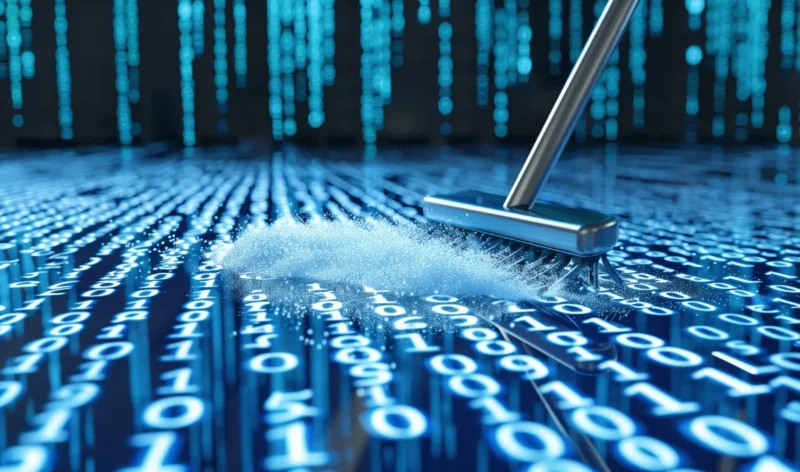Trends Shaping the Future of Data Destruction Services

Data destruction services play a critical role in preventing sensitive and confidential information from falling into the wrong hands. In a nutshell, data destruction refers to the process of securely and completely destroying the data stored on digital devices such as hard drives, mobile phones, tablets, laptops, and printers/copiers.
There are various ways to accomplish this, including digital erasure, degaussing, or physical destruction. When an organization disposes of IT equipment, it’s critically important that they eliminate any possibility that unauthorized parties could recover sensitive or confidential information. Data destruction services offer a guaranteed, fully auditable solution to that problem.
As cyberthreats continue to escalate, data destruction services have emerged as a foundational element of a sound, comprehensive security strategy. Yet just as the threat environment continues to evolve, so too does the body of best practices for protecting sensitive and confidential information. Eco-friendly data destruction techniques, advanced technologies such as AI and blockchain, and increasingly stringent compliance standards are reshaping data destruction services.
Increasing Regulatory Compliance and Legal Requirements
As the digital economy has gained momentum, the privacy and security of personal information has become a very hot topic. Frequent news headlines about large-scale data breaches have brought considerable attention to the problem.
Governments have responded with data protection laws such as Europe’s General Data Protection Regulation (GDPR), the Health Insurance Portability and Accountability Act (HIPAA) in the United States, and local or regional laws like the California Consumer Privacy Act (CCPA).
In parallel, multiple organizations have published cybersecurity standards aimed at safeguarding data. The International Organization for Standardization (ISO), for example, has developed ISO/IEC 27001 for information security management. The Payment Card Industry Security Standards Council (PCI SSC) develops and manages the strict cybersecurity standards that govern the handling of credit card information.
As the economy becomes increasingly digitized, both government regulations and private standards are evolving to address the growing threats of cyberattacks and identity theft.
Data destruction services provide a very important element in an overall compliance strategy, helping companies to adhere to these requirements, avoid financial penalties, and safeguard their public reputations. It’s critical, though, that organizations keep pace with those changing standards. For example, many companies are auditing their data destruction services as a means of reducing risk and ensuring compliance.
The Rise of Eco-Friendly Data Destruction
Environmental regulations are also evolving rapidly, as concerns about environmental sustainability gain momentum. Until relatively recently, for example, many organizations opted for the physical destruction of hard drives as a default method of data destruction. This typically involves shredding hard drives or other components to render them completely unusable.
Although physical destruction is still a requirement in certain scenarios, more and more businesses are choosing environmentally friendly alternatives such as secure digital erasure. This procedure, along with recycling and repurposing of unwanted IT equipment, keeps millions of pounds of e-waste out of landfills.
IT asset disposition (ITAD) companies typically offer a range of services that help their clients to reduce waste, re-use equipment by selling or donating items to charity, or recycle components. In doing so, they contribute to the circular economy, reduce the need for new raw materials, and avoid potential contamination of our environment.
The cumulative effect of these efforts is undoubtedly significant. For every repurposed serve, for example, 42 pounds of carbon are kept out of the atmosphere, and one pound of hazardous materials is diverted from landfills.
Integration of Advanced Technologies in Data Destruction
As technology advances, companies that offer data destruction services are adopting innovative new approaches to asset disposition. Many observers expect that blockchain technology will eventually become a standard element of the data destruction process, offering a transparent and secure method of recordkeeping.
Artificial intelligence (AI) will play a role as well, paving the way for smarter systems capable of detecting potential security weaknesses in storage devices prior to their disposal or redeployment. AI can also be used to automate the process of disassembling equipment and sorting materials, reducing the need for tedious manual labor.

Growing Demand for On-Site Data Destruction Services
Some companies require on-site data destruction services because it affords them the opportunity to observe and verify that the process has been completed properly. Others are satisfied with off-site services, provided that they are fully auditable and backed by stringent security measures such as GPS tracking, tamper-proof seals on the trucks used to transport the equipment, and thorough background checks for all employees who come into contact with the IT assets.
For the record, NCS Global implements all of these security measures, and more. Nevertheless, many companies prefer on-site data destruction services because they prefer to verify data destruction through direct observation.
Companies like NCS are meeting this need with mobile data destruction units that offer a full range of services, from shredding hard drives to secure erasure or degaussing.
Emphasis on Customization and Scalability
Today’s growing companies often have custom requirements when it comes to data destruction. Organizations that have a presence in multiple countries or jurisdictions, for example, may be subject to a myriad of different requirements. There may be distinct regulations governing data privacy and security, as well as environmental regulations that dictate which methods may be used to dispose of e-waste materials.
Some organizations have specific requirements for the timing of data destruction services. When a global shipping company needed to schedule and complete on-site drive shredding operations in multiple states on the same day, they contacted NCS Global. In a period of just 6 hours, we helped this company securely wipe, destroy, and properly dispose of drives from 2 data centers.
There are numerous companies that offer basic data destruction services, yet very few offer the scale, security, and customization options that many of today’s companies need. At NCS Global, we take pride in our 98% customer retention rate, our best-in-class ranking in the industry, and our certifications from e-Stewards, Ecovadis, NAID, and other leading organizations worldwide.
Conclusion
As technology, regulation, and cybersecurity standards evolve, data destruction services will undoubtedly change to meet an increasingly diverse range of requirements. At NCS, we strive to stay on the leading edge of innovation while delivering world-class customer service. As part of our commitment to excellence, we aim to help our customers stay informed so that they can continue to adapt to the rapidly changing world around them.Want to learn more about your options for data destruction services? Contact a member of the NCS Global team to discuss your needs.